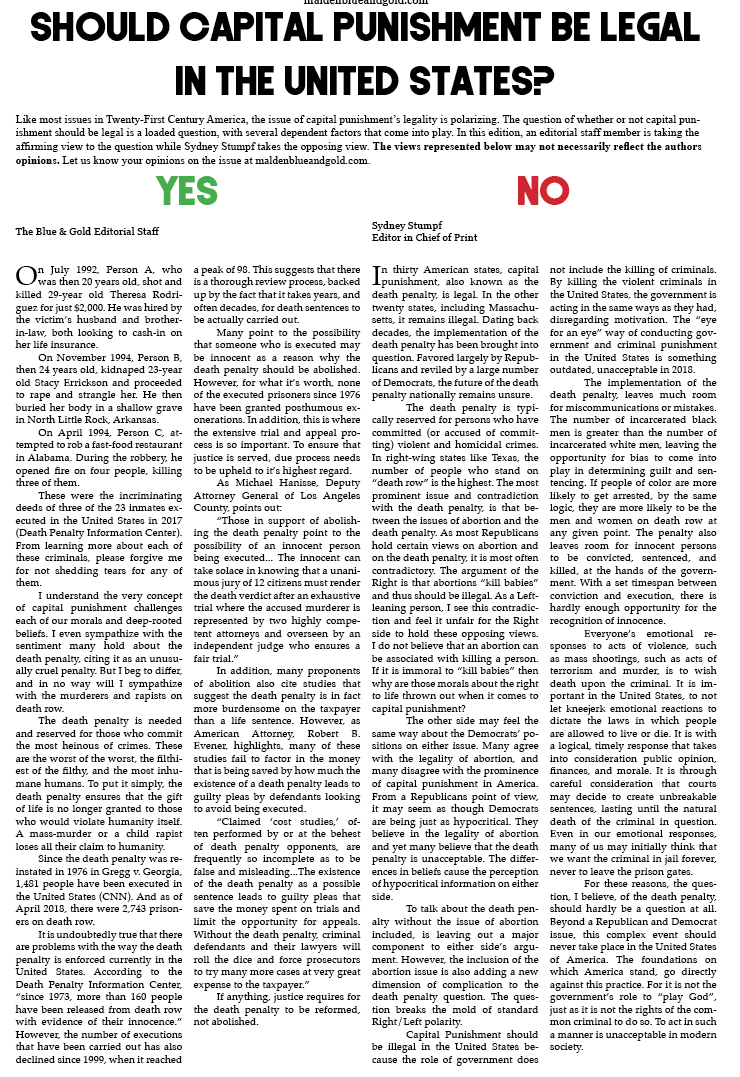
by The Blue & Gold Editorial Staff and Sydney Stumpf

Like most issues in Twenty-First Century America, the issue of capital punishment’s legality is polarizing. The question of whether or not capital punishment should be legal is a loaded question, with several dependent factors that come into play. In this edition, an editorial staff member is taking the affirming view to the question while Sydney Stumpf takes the opposing view. The views represented below may not necessarily reflect the authors opinions. Let us know your opinions on the issue at maldenblueandgold.com.
YES
On July 1992, Person A, who was then 20 years old, shot and killed 29-year old Theresa Rodriguez for just $2,000. He was hired by the victim’s husband and brother-in-law, both looking to cash-in on her life insurance.
On November 1994, Person B, then 24 years old, kidnaped 23-year old Stacy Errickson and proceeded to rape and strangle her. He then buried her body in a shallow grave in North Little Rock, Arkansas.
On April 1994, Person C, attempted to rob a fast-food restaurant in Alabama. During the robbery, he opened fire on four people, killing three of them.
These were the incriminating deeds of three of the 23 inmates executed in the United States in 2017 (Death Penalty Information Center). From learning more about each of these criminals, please forgive me for not shedding tears for any of them.
I understand the very concept of capital punishment challenges each of our morals and deep-rooted beliefs. I even sympathize with the sentiment many hold about the death penalty, citing it as an unusually cruel penalty. But I beg to differ, and in no way will I sympathize with the murderers and rapists on death row.
The death penalty is needed and reserved for those who commit the most heinous of crimes. These are the worst of the worst, the filthiest of the filthy, and the most inhumane humans. To put it simply, the death penalty ensures that the gift of life is no longer granted to those who would violate humanity itself. A mass-murder or a child rapist loses all their claim to humanity.
Since the death penalty was reinstated in 1976 in Gregg v. Georgia, 1,481 people have been executed in the United States (CNN). And as of April 2018, there were 2,743 prisoners on death row.
It is undoubtedly true that there are problems with the way the death penalty is enforced currently in the United States. According to the Death Penalty Information Center, “since 1973, more than 160 people have been released from death row with evidence of their innocence.” However, the number of executions that have been carried out has also declined since 1999, when it reached a peak of 98. This suggests that there is a thorough review process, backed up by the fact that it takes years, and often decades, for death sentences to be actually carried out.
Many point to the possibility that someone who is executed may be innocent as a reason why the death penalty should be abolished. However, for what it’s worth, none of the executed prisoners since 1976 have been granted posthumous exonerations. In addition, this is where the extensive trial and appeal process is so important. To ensure that justice is served, due process needs to be upheld to it’s highest regard.
As Michael Hanisse, Deputy Attorney General of Los Angeles County, points out:
“Those in support of abolishing the death penalty point to the possibility of an innocent person being executed… The innocent can take solace in knowing that a unanimous jury of 12 citizens must render the death verdict after an exhaustive trial where the accused murderer is represented by two highly competent attorneys and overseen by an independent judge who ensures a fair trial.”
In addition, many proponents of abolition also cite studies that suggest the death penalty is in fact more burdensome on the taxpayer than a life sentence. However, as American Attorney, Robert B. Evener, highlights, many of these studies fail to factor in the money that is being saved by how much the existence of a death penalty leads to guilty pleas by defendants looking to avoid being executed.
“Claimed ‘cost studies,’ often performed by or at the behest of death penalty opponents, are frequently so incomplete as to be false and misleading…The existence of the death penalty as a possible sentence leads to guilty pleas that save the money spent on trials and limit the opportunity for appeals. Without the death penalty, criminal defendants and their lawyers will roll the dice and force prosecutors to try many more cases at very great expense to the taxpayer.”
If anything, justice requires for the death penalty to be reformed, not abolished.
NO
In thirty American states, capital punishment, also known as the death penalty, is legal. In the other twenty states, including Massachusetts, it remains illegal. Dating back decades, the implementation of the death penalty has been brought into question. Favored largely by Republicans and reviled by a large number of Democrats, the future of the death penalty nationally remains unsure.
The death penalty is typically reserved for persons who have committed (or accused of committing) violent and homicidal crimes. In right-wing states like Texas, the number of people who stand on “death row” is the highest. The most prominent issue and contradiction with the death penalty, is that between the issues of abortion and the death penalty. As most Republicans hold certain views on abortion and on the death penalty, it is most often contradictory. The argument of the Right is that abortions “kill babies” and thus should be illegal. As a Left-leaning person, I see this contradiction and feel it unfair for the Right side to hold these opposing views. I do not believe that an abortion can be associated with killing a person. If it is immoral to “kill babies” then why are those morals about the right to life thrown out when it comes to capital punishment?
The other side may feel the same way about the Democrats’ positions on either issue. Many agree with the legality of abortion, and many disagree with the prominence of capital punishment in America. From a Republicans point of view, it may seem as though Democrats are being just as hypocritical. They believe in the legality of abortion and yet many believe that the death penalty is unacceptable. The differences in beliefs cause the perception of hypocritical information on either side.
To talk about the death penalty without the issue of abortion included, is leaving out a major component to either side’s argument. However, the inclusion of the abortion issue is also adding a new dimension of complication to the death penalty question. The question breaks the mold of standard Right/Left polarity.
Capital Punishment should be illegal in the United States because the role of government does not include the killing of criminals. By killing the violent criminals in the United States, the government is acting in the same ways as they had, disregarding motivation. The “eye for an eye” way of conducting government and criminal punishment in the United States is something outdated, unacceptable in 2018.
The implementation of the death penalty, leaves much room for miscommunications or mistakes. The number of incarcerated black men is greater than the number of incarcerated white men, leaving the opportunity for bias to come into play in determining guilt and sentencing. If people of color are more likely to get arrested, by the same logic, they are more likely to be the men and women on death row at any given point. The penalty also leaves room for innocent persons to be convicted, sentenced, and killed, at the hands of the government. With a set timespan between conviction and execution, there is hardly enough opportunity for the recognition of innocence.
Everyone’s emotional responses to acts of violence, such as mass shootings, such as acts of terrorism and murder, is to wish death upon the criminal. It is important in the United States, to not let kneejerk emotional reactions to dictate the laws in which people are allowed to live or die. It is with a logical, timely response that takes into consideration public opinion, finances, and morale. It is through careful consideration that courts may decide to create unbreakable sentences, lasting until the natural death of the criminal in question. Even in our emotional responses, many of us may initially think that we want the criminal in jail forever, never to leave the prison gates.
For these reasons, the question, I believe, of the death penalty, should hardly be a question at all. Beyond a Republican and Democrat issue, this complex event should never take place in the United States of America. The foundations on which America stand, go directly against this practice. For it is not the government’s role to “play God”, just as it is not the rights of the common criminal to do so. To act in such a manner is unacceptable in modern society.





